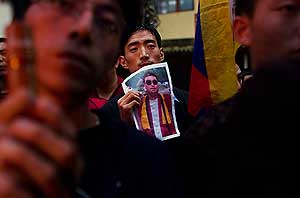Search Buddhist Channel
The Tibetan Dilemma
by Theng Chong Aik, The Buddhist Channel, Feb 19, 2012
Singapore -- China blames the Dalai Lama, who fled Tibet in 1959 for much of the unrest in Tibetan inhabited regions. Among others, he is vilified as a ‘separatist’ and a ‘splittist’. Beijing accuses him and his so-called ‘clique’ for fanning the flames of protest in the current self immolation cases.
 In trying to stamp the unrest, monks and nuns alike are sent to re-education camps. To marginalize and isolate the Dalai Lama, it refuses to deal with governments who invited the Dalai Lama to their countries and even warning others of a strain in relations.
In trying to stamp the unrest, monks and nuns alike are sent to re-education camps. To marginalize and isolate the Dalai Lama, it refuses to deal with governments who invited the Dalai Lama to their countries and even warning others of a strain in relations.
It has taken upon itself to choose the Panchen Lama, also putting in place new regulations and laws, accord itself the final right to approve and recognize all new reincarnated high Lamas and the next Dalai Lama. These steps are taken presumably to pre-empt the future selection process for the next Dalai Lama. If successful, it should
help in paving the way to garner more religious loyalty for the Motherland and also counter separatist sentiments in Tibet.
In their effort to integrate the Tibetans into the Motherland, the Chinese government had tried to influence local cultural practices, erode the usage of the Tibetan as a language by introduction Chinese and English languages into the school curriculum even at primary school level. Never mind the thousands of Buddhist temples and shrines it has since destroyed from the late 1950.
However, one should also point out that Beijing have spent billions in development projects in Tibet over the past several decades and living standards of ethnic Tibetans have undoubtedly been raised as a result of these developments. It has also given ethnic minorities the advantage to a place in the nation universities by giving them
preferential treatment through the lowering of admission criteria. But getting people to trade off their way of life and beliefs for a higher standard of living with limiting freedom and expected conformity to an alien system of government is certainly a no, no, for even the poorest to accept.
What all these doings and practices have done is to cause nothing but simmering resentment in the mind of the Tibetan peoples and without doubt, being passed on to future generations as well. One wonders when the Communists will wake up to the reality that some of such policies and practices just do not work in winning over the heart and mind of anyone on the receiving end.
On the other hand, what we hear from the Tibetan government-in-exile and it’s so called ‘clique’ of Human Rights Watch, Free Tibet movement and other interest groups is the inevitable condemnation of the Chinese government policies with words such as ‘repressive’, 'regulated’, 'eradicate’, 'isolate’ and ‘vicious cycle of radicalization’. Other than these words and telling the Chinese government to do what they considered as appropriate and necessary; one have yet to see such rhetoric achieving any substantive good or better rights for ethnic Tibetans.
We can expect to see all things continuing to remain the same in Tibet as ever before. Frankly, the fate of the Tibetan people now and in the near future lies solely in the hand of the Chinese government. All others that come into the picture are nothing but just ‘side shows’.
Lobsang Sangay, the prime minister of the Tibetan government-in-exile commented that one Buddhist lesson he have learned is that ‘one who is born has to die’. Quote - 'that means what you do is what you leave behind. If you live for yourself, you won't make much difference. I, as a Buddhist, as a Tibetan, want to live for a cause greater than
myself and my life’.
What is this greater cause he is referring to, one wonders? But for sure in the Dhammapada verse 6, it is states that ‘There are those who do not realize that one day we all must die. But those who do realize this settle their quarrels’. If that is exactly what the Honourable Lobsang Sangay has in mind, than I would say, yea, it is certainly a
great cause.
In the meantime the self-immolations and violent are likely to continue but hopefully it will not reach the point where the religious order of monks and nuns will become a rarity in Tibet. All we can do for now is to give our fellow Tibetan Buddhists and non-Buddhists
alike the moral support, sympathy, compassion, and that all will be well and get better in the near future.
Please support to keep NORBU going:
For Malaysians and Singaporeans, please make your donation to the following account:
Account Name: Bodhi Vision
Account No:. 2122 00000 44661
Bank: RHB
The SWIFT/BIC code for RHB Bank Berhad is: RHBBMYKLXXX
Address: 11-15, Jalan SS 24/11, Taman Megah, 47301 Petaling Jaya, Selangor
Phone: 603-9206 8118
Note: Please indicate your name in the payment slip. Thank you.
We express our deep gratitude for the support and generosity.
If you have any enquiries, please write to: editor@buddhistchannel.tv

